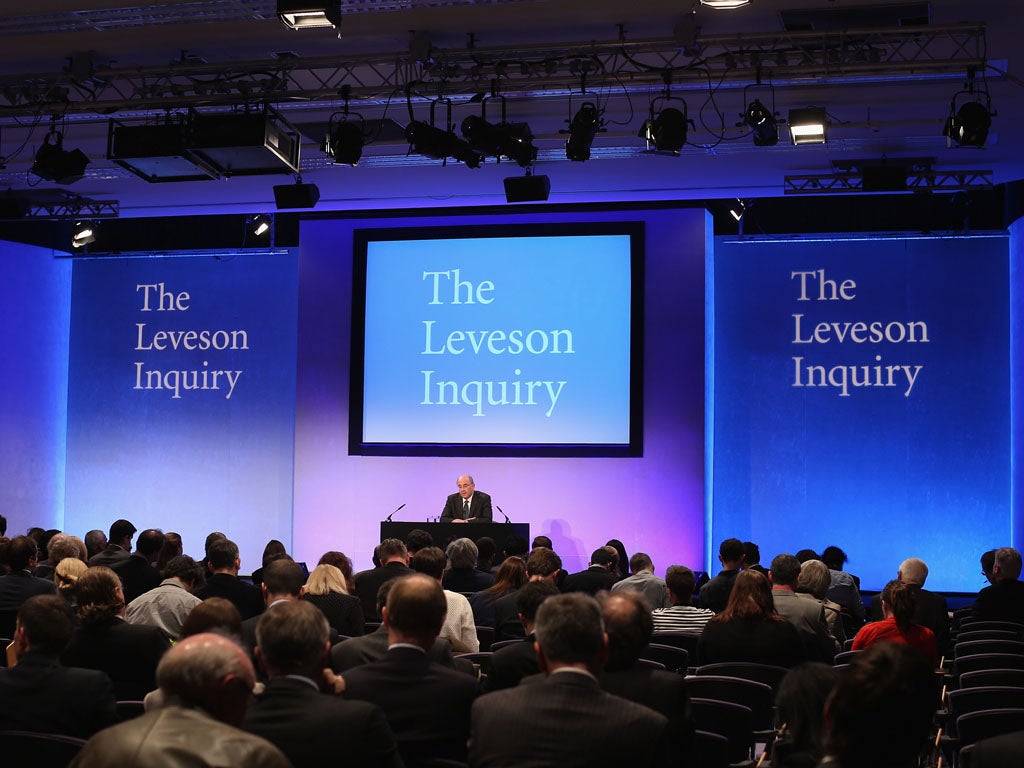Leveson: As someone who was hacked by the News of the World, I believe this scandal is about abuse of power
Leveson said the press is exercising unaccountable power which nobody holds to account.

It all ended where it began, in the brutalist concrete Queen Elizabeth II conference centre in Central London.
Just over a year ago, I walked across Parliament Square from Westminster tube station to hear one editor after another warn that the Leveson Inquiry was a dire threat to press freedom. Yesterday I made the same journey, this time to sit in a hushed fourth floor room and read an advance copy of Lord Justice Leveson’s report.
The first thing to arrive was the summary, a modest document of 50 pages. Then officials began delivering cardboard boxes containing the four-volume, 2000-page report itself. I don’t know how much it weighs but I can hardly lift it, and it’s weighty in other ways as well. After days of hysterical claims about Britain turning into Zimbabwe, and editors proclaiming their readiness to go to prison, Lord Leveson didn’t declare martial law after all. He didn’t even, as far as I could tell, strangle any kittens.
Instead, in the measured paragraphs of a law lord, Leveson pointed out that not a single witness had proposed that the Government or MPs should be involved in the regulation of the press. Clearly, the judge has discovered that sections of the press are as cavalier about facts when they write about their own affairs as they are when they tackle ‘love rats’ and ‘reality’ TV stars.
While we’re still absorbing the details of Leveson’s proposal – an independent regulatory body, underpinned by legislation – what’s already clear is that his critique of parts of the press is devastating. As someone whose phone was hacked by the News of the World, I’ve always believed that this scandal is about abuse of power. Some newspapers became so obsessed by celebrity and private life that they failed to do their proper job, which is vital in a democracy. And I discovered yesterday that Lord Leveson agrees with me. Far from holding power to account, his report declares that in some regards ‘the press is exercising unaccountable power which nobody holds to account’.
That’s a damning verdict. So is Leveson’s conclusion that British politicians have been too close to the press for 30 to 35 years. I’m pleased that he’s listened to women’s groups who gave evidence about the portrayal of women in the tabloids. Leveson thinks the Daily Sport is ‘hardly distinguishable’ from the softer end of top-shelf porn, and that the Sun and the Daily Star have a tendency to ‘sexualise and demean’ women. One of the report’s most welcome recommendations is that groups representing women should be able to make complaints to the new regulator.
The report is robust about phone hacking. Leveson is clear that hacking was ‘far more than a covert, secret activity’, known to nobody except one or two practitioners of the ‘dark arts’. The Inquiry has concluded that hacking may well have taken place at the Mirror titles and that it occurred ‘within the industry on more than a localised basis’ from the late 1990s to 2006.
With me at the QEII Centre yesterday were many victims of press harassment. We were pleased to read the report’s condemnation of ‘injudicious, sensationalised and intemperate reporting’, and an acknowledgement of the emotional impact of intrusion into private grief. It was also instructive to see one of Leveson’s sternest critics, the Daily Mail editor Paul Dacre, in the firing line for once. The report cites his testimony as evidence of a ‘cultural unwillingness in parts of the press to consider the consequences of publication on the individuals concerned’.
Victims of hacking and intrusion have waited a long time for someone to stand up for them. Yesterday Lord Leveson did much of what we hoped for, only to have one of his key recommendations rejected by David Cameron in the House of Commons. As the prime minister spoke, the mood at the QEII Centre changed from cautious optimism to disbelief. Let me assure him that he has a fight on his hands.
Join our commenting forum
Join thought-provoking conversations, follow other Independent readers and see their replies
Comments